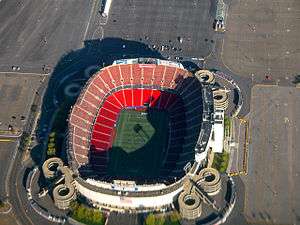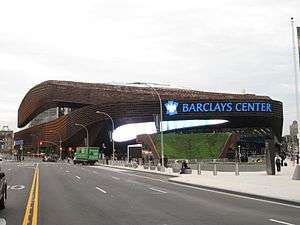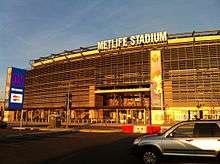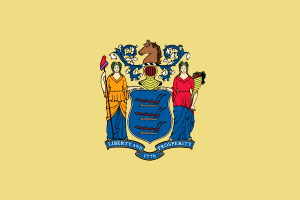Giants Stadium
Giants Stadium was a stadium located in East Rutherford, New Jersey, in the Meadowlands Sports Complex. The venue was open from 1976 to 2010, and primarily hosted sporting events and concerts in its history. The maximum seating capacity was 80,242.[3] The structure itself was 756 feet (230 m) long, 592 feet (180 m) wide and 144 feet (44 m) high from service level to the top of the seating bowl and 178 feet (54 m) high to the top of the south tower. The volume of the stadium was 64,500,000 cubic feet (1,830,000 m3). 13,500 tons of structural steel were used in the building process and 29,200 tons of concrete were poured.[4] It was owned and operated by the New Jersey Sports and Exposition Authority (NJSEA).
In the early 1970s the New York Giants, who at the time were sharing Yankee Stadium with the New York Yankees baseball team, began looking for a home of their own. The Giants struck a deal with the fledgling New Jersey Sports and Exposition Authority in 1971 and ground broke on the construction of the new facility in 1972. The 1972 season was the Giants' last full season in Yankee Stadium, as the ballpark was closed for a massive reconstruction following the end of the Yankees' season. Since their new stadium would take a significant amount of time to finish, and they could not use their home facility due to the construction, the Giants moved out of state and played in New Haven, Connecticut at the Yale Bowl early in the 1973 season. After spending two years in New Haven, the Giants would return to New York for one final season in 1975 and shared Shea Stadium in Flushing, Queens with the Yankees, New York Mets, and New York Jets. The Giants finally moved into their new home on October 10, 1976.
Eight years after Giants Stadium opened, it gained a second major tenant. The Jets' lease at Shea Stadium had expired at the end of the 1983 season and team owner Leon Hess was having trouble negotiating terms of a new lease to stay in Queens. The city of New York was unwilling to agree to his terms and Hess decided to move the Jets to the Meadowlands permanently (the team previously played a regular season game there in 1977). Their first game in Giants Stadium was on September 6, 1984. With the Jets now playing at the stadium, the grounds crew needed to find a way to set their games apart from Giants games and make them more inviting for their fans and eventually came up with a series of green and white banners and coverings that were hung over the field-level blue walls that circled the stadium and (later) the four entrance gates outside the stadium.
The sharing of the stadium by both the Giants and Jets enabled it to break a record that had long been held by Chicago's Wrigley Field. Entering the 2003 season, its 28th, Giants Stadium had played host to 364 NFL games, second only to the 365 played at Wrigley by the Chicago Bears in their 50 seasons there. The Giants' season opening game with the St. Louis Rams tied the record, and the following week the Jets' home opener against the Miami Dolphins broke it.
Giants Stadium was closed following the 2009 NFL season following the construction of what is now MetLife Stadium in the surrounding parking lot. The stadium's final event was the January 3, 2010 game featuring the Jets hosting the Cincinnati Bengals on Sunday Night Football. A month after the game, demolition of the structure began and was completed on August 10, 2010.
History
Giants Stadium was the first major league sporting venue in New Jersey (though the Brooklyn Dodgers had played seven home games at Roosevelt Stadium in Jersey City in 1956 & 1957), and its success, along with that of the Giants in the 1980s was a major impetus behind increased pride and enthusiasm among New Jersey residents.
First year in business
Giants Stadium opened on October 10, 1976, as 76,042 fans witnessed a loss by the Giants to the Dallas Cowboys. The Giants had played their first four games on the road that season. College football made its debut at Giants Stadium on October 23, 1976, with Rutgers University defeating Columbia 47–0 and extending their winning streak to 14 games.[5]
The New York Giants played their season-opening home game in the stadium on September 18 of the 1977 season (a 20–17 win over the Washington Redskins).[6]
Other pro football teams that have used Giants Stadium
Other professional football teams that have called Giants Stadium home over the years include the New Jersey Generals of the USFL; the New York/New Jersey Knights of the World League of American Football; the New York/New Jersey Hitmen of the XFL and the New York Sentinels (who played one game at the stadium in the United Football League's inaugural season). The 1985 USFL championship game which turned out to be the last USFL game played was held at Giants Stadium.
In the second week of the 2005 season, the New Orleans Saints used the stadium for a "home" game against the Giants because of extensive damage to the Louisiana Superdome after Hurricane Katrina. One end zone was painted in Saints colors, Saints banners were hung on the walls around the sidelines, and the Saints wore their home jerseys. The game was rescheduled to a Monday night with a special start time of 7:30 PM EDT, preceding the other scheduled game on Monday Night Football.[7] The Giants were normally not visitors at Giants Stadium unless they were playing the Jets.
College football games
The stadium hosted college football games, including the Garden State Bowl from 1978–1981; the Kickoff Classic from 1983 to 2002; the New York Urban League Classic since 1981; a number of Rutgers homes games (including all their home games during the 1993 season); several Notre Dame–Navy and Notre Dame–Army games; and the Army–Navy Game on three occasions, most recently in 2002. Syracuse also played two home games at Giants Stadium during the 1979 season, against West Virginia and Penn State, while the Carrier Dome was under construction. Columbia also played some home games at Giants Stadium in 1983, due to construction at its home stadium. Temple, needing a home field due to a schedule conflict with Veterans Stadium in Philadelphia, used Giants Stadium as their home field versus Penn State in September 1996. Princeton also played one home game at Giants Stadium (against Yale) during the construction of Princeton's new stadium in 1997.
Soccer at Giants Stadium
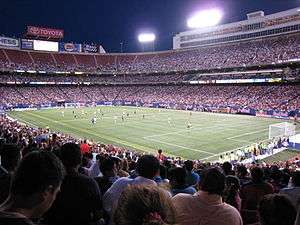
The New York Cosmos of the North American Soccer League moved to Giants Stadium for the 1977 season and remained until the league folded in 1985. The NASL championship game Soccer Bowl '78 and Soccer Bowl '79 were held at Giants Stadium.
Seven games of the 1994 FIFA World Cup soccer tournament were held at Giants Stadium (including the Italy v Bulgaria semi-final), along with several games of the 1999 Women's World Cup.
In 2003, the SuperCoppa Italiana, an annual match pitting the winners of Serie A (Italy's top division) and the Coppa Italia (Italian Cup), was held in Giants Stadium instead of in Italy because both clubs involved (Juventus F.C. and A.C. Milan) were touring the United States late in the summer, when the event is normally scheduled.
In 2005, the stadium played host to several matches in the CONCACAF Gold Cup, including the final, which saw the USA defeat Panama, 3–1 in a penalty shootout after the sides played to a scoreless draw. It again held the final 4 years later for the CONCACAF Gold Cup which saw Mexico defeat the USA 5–0.
It has seen many European soccer tours in recent years, hosting games involving such major soccer clubs as Manchester United, Celtic, Chelsea, Liverpool, Barcelona and Rangers.
It also hosted England's 3–2 victory over Colombia on May 31, 2005.[8]
The New York Red Bulls (formerly the New York/New Jersey MetroStars) of Major League Soccer played at the stadium for their first 14 seasons. They moved to the soccer-specific Red Bull Arena in nearby Harrison, New Jersey in 2010.
1988 Marlboro Cup (New York)
| Date | Team #1 | Result | Team #2 | Round |
|---|---|---|---|---|
| August 19, 1988 | 1–1 (6–5 on pen.) | Semifinals | ||
| 0–0 (7–6 on pen.) | ||||
| August 21, 1988 | 3–2 | Third Place Match | ||
| 4–0 | Final |
1989 Marlboro Cup (New York)
| Date | Team #1 | Result | Team #2 | Round |
|---|---|---|---|---|
| June 2, 1989 | 2–1 | Semifinals | ||
| 2–1 | ||||
| June 4, 1989 | 2–1 | Third Place Match | ||
| 0–3 | Final |
1990 Marlboro Cup (New York)
| Date | Team #1 | Result | Team #2 | Round |
|---|---|---|---|---|
| August 10, 1990 | 1–0 | Semifinals | ||
| 1–0 | ||||
| August 12, 1990 | 2–1 | Third Place Match | ||
| 1–0 | Final |
1994 FIFA World Cup matches
| Date | Time (EDT) | Team #1 | Result | Team #2 | Round | Spectators |
|---|---|---|---|---|---|---|
| June 18, 1994 | 16.00 | 0–1 | Group E | 75,338 | ||
| June 23, 1994 | 16.00 | 1–0 | 74,624 | |||
| June 25, 1994 | 12.30 | 1–2 | Group F | 76,322 | ||
| June 28, 1994 | 12.30 | 0–0 | Group E | 72,404 | ||
| July 5, 1994 | 16.30 | 1–1 (1–3 on pen.) | Round of 16 | 71,030 | ||
| July 10, 1994 | 12.00 | 2–1 | Quarterfinals | 72,000 | ||
| July 13, 1994 | 16.00 | 1–2 | Semifinals | 74,110 |
1996 United States Cup matches
| Date | Team #1 | Result | Team #2 | Round | Spectators |
|---|---|---|---|---|---|
| June 12, 1996 | 0–1 | Game 3 of 6 | 21,322 | ||
| June 15, 1996 | 1–0 | Game 5 of 6 | 14,624 |
1996 & 1997 Major League Soccer All-Star Games
Giants Stadium hosted the first two Major League Soccer All-Star Game's ever played. The games were played in East vs. West format. The 1996 game was the first game of a doubleheader. That second game was between Brazilian soccer team and a team of FIFA All-Stars
1996:
| Date | Game | Team #1 | Result | Team #2 | Spectators |
|---|---|---|---|---|---|
| July 14, 1996 | Game 1 of 2 | East | 3–2 | West | 78,416 |
| Game 2 of 2 | 2–1 | FIFA All-Stars |
1997:
| Date | Team #1 | Result | Team #2 | Spectators |
|---|---|---|---|---|
| July 14, 1996 | East | 5–4 | West | 24,816 |
1999 FIFA Women's World Cup matches
| Date | Time (EDT) | Team #1 | Result | Team #2 | Group | Spectators |
|---|---|---|---|---|---|---|
| June 19, 1999 | 15.00 | 3–0 | Group A | 78,972 | ||
| 17.30 | 7–1 | Group B | ||||
| June 26, 1999 | 12.00 | 1–4 | Group C | 29,401 | ||
| 14.30 | 3–1 | Group D |
2000 Nike United States Cup matches
| Date | Time (EDT) | Team #1 | Result | Team #2 | Spectators |
|---|---|---|---|---|---|
| June 11, 1996 | 13.00 | 3–0 | 45,008 | ||
| 15.30 | 2–1 |
United States won the 2000 Nike U.S. Cup in Game 1 of the doubleheader
2003 Supercoppa Italiana
| Date | Time (EDT) | Team #1 | Result | Team #2 | Spectators |
|---|---|---|---|---|---|
| August 3, 2003 | 21.00 | 2002-03 Serie A Winners | 1–1 (5–3 on pen.) | 2002–03 Coppa Italia Winners | 54,128 |
2005 CONCACAF Gold Cup matches
| Date | Time (EDT) | Team #1 | Result | Team #2 | Round | Spectators |
|---|---|---|---|---|---|---|
| July 21, 2005 | 18.00 | 1–2 | Semifinal | 41,721 | ||
| 21.00 | 2–3 | |||||
| July 24, 2005 | 15.00 | 0–0 (3–1 on pen.) | Final | 31,018 |
Colombia, a CONMEBOL member, were invited to compete in the CONCACAF tournament, along with South Africa.
2007 CONCACAF Gold Cup matches
Only four games in Group C were played at Giants Stadium.
| Date | Time (EDT) | Team #1 | Result | Team #2 | Spectators |
|---|---|---|---|---|---|
| June 8, 2007 | 19.00 | 3–2 | 20,230 | ||
| 21.00 | 2–1 | ||||
| June 10, 2007 | 16.00 | 2–1 | 68,123 | ||
| 18.00 | 2–2 |
2009 CONCACAF Gold Cup Final
| Date | Time (EDT) | Team #1 | Result | Team #2 | Round | Spectators |
|---|---|---|---|---|---|---|
| July 26, 2009 | 15.00 | 0–5 | Final | 79,156 |
Pope John Paul II at Giants Stadium
The second largest crowd to ever attend an event at Giants Stadium was 82,948, as Pope John Paul II celebrated Mass during a rainstorm on October 5, 1995. The record was broken on September 24, 2009 with an attendance of 84,472 at the U2 concert.
Concerts
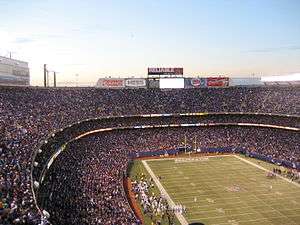
The stadium played host to Amnesty International's final A Conspiracy of Hope Benefit Concert on June 15, 1986. The show was a sold-out, all-day event, running from noon until 11 p.m. and broadcast on MTV. The show was headlined by U2 and Sting and also featured Bryan Adams, Peter Gabriel, Joan Baez, The Neville Brothers and The Police. Additional artists that performed include John Eddie, with Max Weinberg, Third World, The Hooters, Peter, Paul and Mary, Steven van Zandt, with Bob Geldof, Stanley Jordan, Joan Armatrading, Jackson Browne, Rubén Blades, with Fela Kuti and Carlos Santana, Yoko Ono, Howard Jones, Miles Davis and Joni Mitchell. Spoken introductions were made by Billy Graham, Bill Bradley, Daryl Hannah, Robert De Niro, Christopher Reeve, Michael J. Fox and Muhammad Ali. Pete Townshend was scheduled to perform, but cancelled at the last minute, when his father, Cliff Townshend, became gravely ill, which would have been his first US solo appearance. This also marked The Police's final full-live performance together, until their 2007 Reunion Tour, 21 years later.
The stadium played host to The Tattoo the Earth Tour on July 20, 2000. The show featured performances by Slipknot, Slayer, Sevendust, Sepultura, Hed PE, Mudvayne, downset., Hatebreed, Full Devil Jacket, Famous, Amen, U.P.O., Nothingface, PPM, Cold, Relative Ash, Systematic, Six Feet Under, Candiria, Lamb of God, God Forbid, Darkest Hour, Unearth, All That Remains, Dropkick Murphys, Sick of It All, Tiger Army, Converge, The Unseen, Reach the Sky, Stretch Arm Strong, Kill Your Idols and Nashville Pussy, including the only appearance by Metallica during the tour and also featured 42 tattoo artists from Australia, Austria, France, Germany, Malaysia, Manitoba, Spain, Switzerland and the US.
The stadium has also played host to music festivals, including The Monsters of Rock Festival, Music at the Meadowlands, Ozzfest and The Bamboozle (in the parking lot, annually, since 2003).
Dave Matthews Band played the stadium 9 times from 1998–2001, including three nights each in 2000 and 2001. On June 11, 2001 (the first of three nights), the band played the song "Two Step", where Dave Matthews sung the improvisational lyrics "let it rain", where then a thunderstorm broke out. This has been called "Two Step In The Rain" by fans, and can be heard on The Best of What's Around Vol. 1. When Matthews learned of the closing of Giants Stadium, he said "I can't imagine I'll ever fall in love with a stadium like I did with Giants Stadium."
Many locals say it is the home turf of Bruce Springsteen & The E Street Band, due to the fact that they came from Freehold, New Jersey. Several songs on his 1986 live album Live/1975-85 were recorded at shows at the stadium in August 1985.
Springsteen wrote the song "Wrecking Ball" in response to the closing of the stadium and in 2009 performed it for the first time at the final five concerts at Giants Stadium.[9] It would go on to be the title track of his next studio album, released over two years later.
Seating Capacity
The seating capacity over the years went as the following:
- 76,891 (1976–1993)[10]
- 77,121 (1994)[11]
- 78,148 (1995–1998)[12]
- 79,469 (1999–2001)[13]
- 80,242 (2002–2010)[14]
Demolition
Demolition work on Giants Stadium began at approximately 10:00 AM EST on February 4, 2010 at the Gate B spirals, the closest point to the new stadium. The demolition work was expected to cost more than $10 million and took approximately four months to complete.[15][16] As of May 10, 2010 approximately 50% of the Stadium had been demolished. On May 19, 2010 at 8:30pm, demolition crews pulled down the press box, the highest part of the stadium. In the early afternoon of June 28, 2010, the last section of stadium grandstand came down, leaving just two later demolished upper level escalators standing.
Much of the stadium's memorabilia was sold to a sports memorabilia company, such as the framed pictures from the suites, all of the building's signage and a good portion of the saved bowl seats. Other property was liquidated to other NJSEA facilities such as the IZOD Center and Monmouth Park Racetrack.
Changes and co-tenants
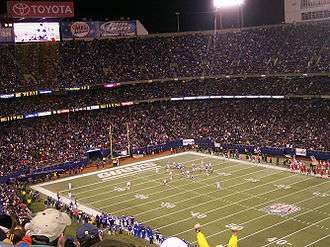
To accommodate these varied events, Giants Stadium sported various playing surfaces in its history. From its opening until the end of the 1999 NFL season, Giants Stadium sported an AstroTurf playing surface. This surface was covered by Bermuda grass sod for the World Cup in 1994, identical to that at the Rose Bowl where the other semifinal and the finals were held (so that both teams in the finals would have played on identical surfaces). The grass was removed after the World Cup, as it would have died in the New Jersey winter. The MetroStars installed a grass field with interchangeable trays each spring that was removed prior to football season, forcing the team to play the remainder of its season on the AstroTurf field used by the football teams. (It should be noted that when the New York Cosmos called Giants Stadium home, they played on the stadium's artificial surface and never used a grass field.)
The AstroTurf was replaced in 2000 by a system of interchangeable grass trays similar to those put in place for soccer, but was kept in place under the trays to aid in draining the field when it got wet. Over the next three years, the conditions would worsen as the season went on and the field quality was typically rated just as low as the old, hard AstroTurf had been. Giants Stadium finally scrapped the grass in favor of FieldTurf for the 2003 season, a surface which remained in place until the stadium closed.
The New York Jets left Shea Stadium and moved to Giants Stadium in 1984 after years of suffering under onerous lease terms imposed at the insistence of baseball's New York Mets. When they moved across the Hudson, many predicted the stadium would be renamed. While the Jets were attracted by the stadium's larger capacity (it held 15,000 more seats than Shea did in its football configuration), they were understandably displeased at the prospect of playing in a facility named after another team. However, under the terms of the stadium lease, changing the name of the stadium required the approval of the Giants, and they were unwilling to do so. As such, for years afterward the Jets referred to Giants Stadium as "The Meadowlands" whenever they played there.
Thanks largely to the dual occupancy of Giants Stadium by two NFL teams since 1984, it surpassed Wrigley Field (home of the Chicago Bears for 50 seasons) as the venue to have hosted more NFL games than any other in league history. The game played between the Jets and Miami Dolphins on September 14, 2003 was the 366th regular season NFL game at Giants Stadium breaking Wrigley's regular season record.[17]
Since the stadium was originally built for the Giants, the stadium's lower walls were blue and the seats and the stadium's four gates were red and blue to reflect the team colors. When the Jets moved in, green banners were hung over the walls and eventually over the outer gates of the stadium anytime the team hosted a game.[18] In addition, team-specific endzone decorations would be changed for Jets home games. This was accomplished by either painting over the Giants logos, or replacing the turf section of each endzone. Midfield decorations at the 50-yard line were typically not team-specific (in early years a Meadowlands logo, and later a NFL shield), which could be used for both teams' games.
In mid-December, traditionally the stadium hosted a Saturday-Sunday NFL doubleheader, with the Giants playing a home game one day and the Jets playing the other. The night between the games was a challenge for the stadium grounds crew, as they only had hours to convert the stadium from one team's colors to the other. As per the NFL schedule, the Giants and the Jets play each other once every four years. In that case, there was a predetermined home team, and a predetermined away team. In those games, the away team gets a rare away game in their own home stadium. The Giants and Jets typically play each other every year in the third week of the NFL Preseason, and the teams annually rotated the home and away teams.
The Jimmy Hoffa urban legend
For some years, a popular urban legend purported that the remains of Jimmy Hoffa, whose disappearance coincided with construction of the stadium, had been buried under one of the end zones at the field.[19] This led Sports Illustrated to suggest that this "takes on special meaning when a punter goes for the 'coffin corner.'"[20] In a similar vein, sportscaster Marv Albert once said that a team was "kicking towards the Hoffa end of the field." This was tested by the Discovery Channel show MythBusters, and they were unable to find any sign of a body.
Notable moments
- October 10, 1976: The Giants played their first ever regular season game at Giants Stadium, a 24–14 loss to the Dallas Cowboys in front of 76,042 in attendance.[21]
- October 1, 1977: Soccer legend Pelé played his last game, an exhibition match between the Cosmos and Santos. He played the first half for the Cosmos and the second half for his old Brazilian team.[22]
- October 28, 1978: Rutgers beat Columbia 69–0. The Lions' humiliating defeat was the last game in one of the oldest rivalries in college football. Columbia's young coach Bill Campbell retired from coaching after the game and went on to a vastly more successful career in the Silicon Valley.[23]
- November 19, 1978: Giants quarterback Joe Pisarcik fumbled the handoff to Larry Csonka with just seconds remaining in the game, allowing Herman Edwards (later a Jets head coach) to scoop it up and run it back for a touchdown, giving the Philadelphia Eagles an improbable 19–17 win. This play would be known as "The Miracle at the Meadowlands", and helped lead to the hiring of Ray Perkins as head coach, and later George Young as general manager.[24][25] Pisarcik's career in New York never recovered, and Phil Simms was drafted shortly after.[26]
- September 6, 1984: The New York Jets moved into Giants Stadium, losing their first game to the Pittsburgh Steelers by a score of 23–17.[27]
- July 29, 30 and 31, 1984: The Jacksons performed three sold out shows during their Victory Tour in front of 136.000 in attendance.[28]
- July 14, 1985: The Baltimore Stars defeat the Oakland Invaders, 28–24, in the 1985 USFL Championship Game, the final game in league history.[29]
- August–September 1985: Bruce Springsteen and The E Street Band performed six sold out shows on the final leg of their Born in the U.S.A. Tour.[30]
- December 28–29, 1985: Giants Stadium makes history by playing host to multiple playoff games in the same weekend. The Jets host the first playoff game in stadium history, as well as their first since hosting the Buffalo Bills in 1981 at Shea Stadium,on December 28, losing to the eventual AFC champion New England Patriots 26-14 in the AFC Wild Card Game. The next day the Giants, who are playing their first playoff game at home since they lost the 1962 NFL Championship Game at Yankee Stadium, defeat the defending Super Bowl champion San Francisco 49ers 17-3 in the NFC Wild Card Game.[31][32]
- January 11, 1987: The New York Giants shut out the Washington Redskins 17–0 in the NFC Championship game to advance to Super Bowl XXI in Pasadena. Two weeks later, the Giants would win Super Bowl XXI, their first Super Bowl victory.[33][34]
- November 8, 1987: The New York Giants defeated the New England Patriots 17–10 in ESPN's first televised regular season game.[35]
- December 18, 1988: In a testament to the Giants–Jets rivalry, the Jets helped eliminate the Giants from playoff contention in the final week of the 1988 regular season. Jets quarterback Ken O'Brien threw a touchdown pass to wide receiver Al Toon with 39 seconds left to give the Jets a 27–21 victory. The Giants were mathematically eliminated when their loss was combined with the Philadelphia Eagles victory over the Dallas Cowboys, and the Los Angeles Rams' 38–16 victory over the eventual Super Bowl champion San Francisco 49ers due to tiebreakers.
- June 30, 1989: The Who sold out four consecutive shows performing portions of the rock opera Tommy to open the first of two sets each night.[36]
- June–July 1994: Giants Stadium served as a venue for the 1994 FIFA World Cup, opening with Ireland's 1–0 win over Italy, and concluding with Italy's 2–1 win over Bulgaria in the semifinals.[37][38]
- July 18, 1994: Pink Floyd performed their final US show ever on their Division Bell Tour in which they performed The Dark Side of the Moon in its entirety..
- October 19, 1997: Following the Jets defeating the Patriots, two individuals were violently accosted and stabbed by an underage and drunken Patriots fan. The incident would lead to various lawsuits and the establishment of higher security standards and no alcohol being served after the 3rd quarter at Giants Stadium.
- December 13, 1998: The New York Giants defeated the then-13–0 Denver Broncos 20–16 in front of 72,336 in attendance.[39]
- October 23, 2000: In what has been called the greatest game on Monday Night Football, the New York Jets came back from a 30–7 deficit by scoring 30 points in the fourth quarter and another 3 in overtime to beat the Miami Dolphins 40–37. The game is known as the Monday Night Miracle.[40]

- January 14, 2001: On a field of painted mud, the New York Giants defeated the Minnesota Vikings 41–0 in the NFC Championship Game in front of 79,310 in attendance to send the Giants to Super Bowl XXXV in Tampa.[41]
- July–August 2003: Bruce Springsteen and the E Street Band broke their own record with 10 sold-out shows on the Rising Tour.[42]
- December 20, 2003: The New England Patriots defeated the New York Jets 21-16 in ESPN's 200th NFL regular season game.[43][44]
- October 10, 2004: The Television show Queer Eye For The Straight Guy filmed "A Pigskin Proposal" prior to and during a New York Jets home game. It featured a pregame tailgating party and a halftime proposal where Brian Mortensen proposed to Rachel Groeneveld.[45]
- September 1, 2005: The punk rock band Green Day sold out Giants Stadium with Against Me! and Jimmy Eat World. It was their biggest concert played in North America.[46]
- December 26, 2005: The New York Jets & The New England Patriots played each other in a classic battle on the last Monday Night Football game on ABC. The Patriots defeated the Jets 31–21.[47]
- January 8, 2006: The largest crowd to witness a Giant game, 79,378, watched a Giants 23–0 playoff loss to the Carolina Panthers.[48]
- July 29, 2006: Bon Jovi played their eighth consecutive sell-out of Giants Stadium. This was also the last concert of their Have a Nice Day Tour.
- July 7, 2007: The "New York" portion of Live Earth, a worldwide series of concerts of pop and rock music featuring various bands and musical artists planned to inspire global warming activism, was held at Giants Stadium.[49] Kenna, KT Tunstall, Taking Back Sunday, Keith Urban, Ludacris, AFI, Fall Out Boy, Akon, John Mayer, Melissa Etheridge, Alicia Keys, Dave Matthews Band, Kelly Clarkson, Kanye West, The Smashing Pumpkins, Roger Waters, Bon Jovi and The Police all performed.
- August 5, 2007: The Police performed in front of 55, 000 people on there The Police Reunion Tour. The band first performed here in 1986 at the Amnesty International A Conspiracy of Hope Tour, and again for Live Earth. Sting (musician) had been here 3 addition times on his own as well. 2 times in 1993 when he opened for the Grateful Dead, and once in 1999 for NetAid. This however was the band's 3rd and last appearance at the stadium for a concert, and there first concert to take place on a tour stop instead of a charity concert.
- August 18, 2007: 66,237 attended as the largest crowd ever for a regular-season MLS match at Giants Stadium (or any match between two MLS teams here).[50] The MetroStars/Red Bulls previously had several matches with 50,000–65,000, and this day's match was also their highest attendance home or away for a regular-season match. This LA Galaxy versus Red Bulls match also set a new high for an MLS match that was not a part of a double-header, even beating the highest MLS Cup Final attendance (in 2002: 61,316).
- September 9, 2007: New England Patriots CB Ellis Hobbs set an NFL record by taking the second-half kickoff 108 yards for a touchdown against the New York Jets in a 38–14 opening day victory. The play also tied the record for the longest play in NFL history at the time, matching the 108-yard missed field goal returns by the Chicago Bears' Devin Hester against the Giants in 2006, and the Bears' Nathan Vasher the previous season against San Francisco.[51] That record was broken 8 weeks later when San Diego Chargers CB Antonio Cromartie returned a missed field-goal 109 yards for a touchdown against the Minnesota Vikings.
- December 29, 2007: The New England Patriots closed out their undefeated 16–0 regular season at Giants Stadium with a 38–35 win over the New York Giants in front of a record regular season crowd on 79,110. In the fourth quarter, Patriots QB Tom Brady broke Peyton Manning's NFL record of 49 TD passes set in 2004, with his NFL record 50th TD pass, a 65-yard touchdown pass to wide receiver Randy Moss, who on the same play set the record for most touchdown receptions in a single season with 23, breaking the record held previously by Jerry Rice with 22 touchdown receptions set in 1987.[52]
- June 8, 2008: The USA played then world #1 Argentina to a scoreless draw in front of a crowd of 78,682.[53]
- July 26, 2009: In the 2009 CONCACAF Gold Cup Final 79,156 fans witnessed Mexico beat the USA 5–0, Mexico's first win against the USA on American soil in a decade.[54]
- September 23–24, 2009: U2 played two consecutive sold out shows at Giants Stadium, their last two shows of the famous venue, as part of their U2 360 tour. On the second night of the performance, Bono announced that the attendance record has been broken. He also joked that "not even the pope had as many people there." The final attendance was 84,467.[55]
- October 9, 2009: Bruce Springsteen and the E Street Band played in the final concert at Giants Stadium. The concert capped a five-night stand of performances in September and October, highlighting Springsteen's classic albums, Born To Run, Darkness on the Edge of Town, and Born In The USA as well as debuting a new song in honor of New Jersey and Giants Stadium entitled, "Wrecking Ball." [56]
- October 24, 2009: The final soccer game at Giants Stadium was played between the New York Red Bulls and Toronto FC, with New York winning 5–0.[57]
- December 27, 2009: The Giants played their final home game in the stadium against the Carolina Panthers, losing by a score of 41–9.[58]
- January 3, 2010: The Jets defeated the Cincinnati Bengals 37–0 in the final game at Giants Stadium. The victory would also earn the Jets a playoff berth.[59]
In popular culture
- Giants Stadium is featured in the 2008 film, The Day the Earth Stood Still, where it is destroyed by nanites.[60]
References
- 1 2 3 4 5 6 "NJSEA Economic Development". New Jersey Sports and Exposition Authority. Retrieved May 24, 2012.
- ↑ Federal Reserve Bank of Minneapolis Community Development Project. "Consumer Price Index (estimate) 1800–". Federal Reserve Bank of Minneapolis. Retrieved October 21, 2016.
- ↑ "Giants Stadium Seating Chart, Giants Stadium Tickets, Giants Stadium Maps". Gotickets.com. Retrieved 2010-02-07.
- ↑ "Giants Stadium Facts". bigbluetailgate.com. Retrieved 2011-09-09.
- ↑ Amdur, Neil (October 24, 1976). "Dorsett Breaks Rushing Mark; Rutgers Trounces Columbia". The New York Times. Retrieved 2010-01-04.
- ↑ Katz, Michael (September 19, 1977). "Kick to Beat Redskins, 20-17, Set Up by Carson's Fumble Recovery". The New York Times. Retrieved 2010-06-06.
- ↑ Caldwell, Dave (September 15, 2005). "N.F.L. Tries to Create Home Field for Saints". The New York Times. Retrieved 2010-02-07.
- ↑ Vecsey, George (June 1, 2005). "For a Day, Giants Stadium Is a Friendly Pub". The New York Times. Retrieved 2010-07-04.
- ↑ Billboard -Vol. 121, No. 45 14 Nov 2009 ""And tearing down Giants Stadium is so symbolic for us that Bruce wrote his recent song, 'Wrecking Ball,' about his feelings about the end of his neighborhood football field, where he has played 24 times.""
- ↑ Anderson, Dave (September 19, 1983). "Why Jets Will Move to Jersey". Star-News. Wilmington. Retrieved 2011-11-22.
- ↑ Schefter, Adam (September 14, 1994). "Jets Hope for Enough Sound to Make the Broncos Furious". The Rocky Mountain News. Denver. Retrieved 2011-11-22.
- ↑ Moritz, Owen (December 27, 1997). "Giants Fans A Mite Ticked Still Waiting On Tickets To Game Today". Daily News. New York. Retrieved 2011-11-22.
- ↑ Freeman, Mike (September 21, 1998). "Pro Football: Jets Heed Coach's Warnings and Wallop Colts". The New York Times. Retrieved 2011-11-22.
- ↑ Hanley, Robert (December 6, 2002). "December Surprise: Giants Stadium; Keeping the Asles Clear". The New York Times. Retrieved 2011-11-22.
- ↑ McShane, Larry (February 4, 2010). "Demolition of Giants Stadium begins as Giants, Jets ready to move into new stadium". Daily News. New York. Retrieved 2010-02-04.
- ↑ "Giants Stadium Demolition Begins". SI.com. February 4, 2010. Retrieved 2010-02-06.
- ↑ Cross, B. Duane (September 14, 2003). "The runaround: Sticking with ground game pays off in Week 2". Sports Illustrated. Retrieved 2008-08-06.
According to Elias Sports Bureau via Michael Eisen of the G-Men, the Dolphins-Jets game was the 366th NFL regular season game played in Giants Stadium, surpassing Wrigley Field in Chicago as the most frequently used stadium in NFL history (regular season only).
- ↑ Jones, Richard Lezin (October 17, 2004). "Home Is Wherever the Jets Hang Their Banners". The New York Times. Retrieved 2010-01-04.
- ↑ Strauss, Robert (June 13, 2004). "So Who Really Is Buried Under Giants Stadium?". The New York Times. Retrieved 2008-01-20.
For years, New Jersey lore has had the body of Mr. Hoffa, the longtime Teamsters president, interred somewhere under Giants Stadium, whose construction coincided roughly with his disappearance in 1975.
- ↑ Payack, Paul JJ; Beard, Robert; Payack, Peter; Lorenzo, Lou; Marcello, Joe (January 26, 2001). "Super Bowl Glossaries". CNN Sports Illustrated. Retrieved 2010-03-11.
- ↑ Amdur, Neil (October 11, 1976). "$68 Million Stadium for Football Giants Is Opened in Jersey". The New York Times. Retrieved 2010-01-04.
- ↑ Kornheiser, Tony (October 2, 1977). "'Love! Love! Love!' Cries Pele to 75,646 in Farewell". The New York Times. Retrieved 2010-01-04.
- ↑ "Columbia College Today". College.columbia.edu. Retrieved 2010-02-07.
- ↑ Mallozzi, Vincent M. (December 21, 2008). "Two Fumbles In a Time Tunnel Separated by 30 Years". The New York Times. Retrieved 2010-01-10.
- ↑ Gola, Hank; Vacchiano, Ralph (January 10, 2009). "Crushing blows and devastating fumbles mark Giant–Eagle rivalry". Daily News. New York. Retrieved 2010-01-10.
- ↑ Katz, Michael (May 5, 1979). "Giants Defend 'Value' in Choice of Simms; Perkins Optimistic Giants Selections". The New York Times. p. S17. Retrieved 2011-11-22.
- ↑ Eskenazi, Gerald (September 7, 1984). "Ineffective Jets Lose to Steelers". The New York Times. Retrieved 2010-01-04.
- ↑ Pareles, Jon (July 30, 1984). "Jacksons at Giant Stadium". The New York Times. Retrieved 2009-01-10.
- ↑ Wallace, William N. (July 15, 1985). "Stars Beat Invaders for U.S.F.L. Title". The New York Times. Retrieved 2009-01-10.
- ↑ Rockwell, John (August 19, 1985). "Springsteen Begins 6-Concert Series". The New York Times. Retrieved 2010-01-24.
- ↑ Eskenazi, Gerald (December 29, 1985). "Jets Routed from Playoffs by Patriots, 26–14". The New York Times. Retrieved 2010-01-17.
- ↑ Litsky, Frank (December 30, 1985). "Giants Stop 49ers in Wild-Card Playoff, 17–3". The New York Times. Retrieved 2010-01-17.
- ↑ Litsky, Frank (January 12, 1987). "Giants Defeat Redskins by 17–0; Reach Super Bowl with Broncos". The New York Times. Retrieved 2010-01-26.
- ↑ Litsky, Frank (January 26, 1987). "Giants Rout Broncos in the Super Bowl". The New York Times. Retrieved 2010-01-26.
- ↑ Eskenazi, Gerald (November 9, 1987). "Giants Pull Together to Win, 17–10". The New York Times. Retrieved 2010-01-17.
- ↑ "Concerts". The Who Concert Guide. Retrieved 2010-01-13.
- ↑ Yannis, Alex (June 19, 1994). "Glory for The Green: Ireland Stuns Italy". The New York Times. Retrieved 2010-01-22.
- ↑ Mifflin, Lawrie (July 14, 1994). "Italians Save Their Best for the Cup's Next to Last". The New York Times. Retrieved 2010-01-22.
- ↑ Pennington, Bill (December 14, 1998). "Broncos Jarred Awake From Their Dream of Perfection". The New York Times. Retrieved 2010-01-22.
- ↑ Cimini, Rich (January 2, 2010). "Former New York Jets Quarterback Vinny Testaverde Recalls 'Miracle' Comeback Over Miami Dolphins". Daily News. New York. Retrieved 2010-01-22.
- ↑ Pennington, Bill (January 15, 2001). "Giants Reach Super Bowl in a 41–0 Rout". The New York Times. Retrieved 2010-01-24.
- ↑ Wilson, Michael (July 16, 2003). "Springsteen's Homecoming, With 55,000 Guests". The New York Times. Retrieved 2010-01-24.
- ↑ Battista, Judy (December 21, 2003). "Patriots Pick Off Jets' Bid for .500 Season". The New York Times. Retrieved 2010-03-07.
- ↑ Griffith, Bill (December 23, 2003). "Namath Incident Not Being Kissed Off". Boston Globe. Retrieved 2010-03-07.
- ↑ |url=http://www.imdb.com/title/tt0932193/.html
- ↑ Pareles, Jon (September 3, 2005). "Now a Band That It Once Would Parody". The New York Times. Retrieved 2010-01-30.
- ↑ Crouse, Karen (December 27, 2005). "For Testaverde, One More Memory and a Milestone; for the Jets, One More Loss". The New York Times. Retrieved 2010-01-08.
- ↑ "Giants Stadium Facts – New York Giants". History.giants.com. Retrieved 2010-02-07.
- ↑ Pareles, Jon (July 9, 2007). "An Alignment of the Stars in a Plea for Green Heard Round the Planet". The New York Times. Retrieved 2010-01-30.
- ↑ Home
- ↑ "Patriots' Ellis Hobbs Sets NFL Record with 108-yard Kickoff Return". Sporting News. Associated Press. September 9, 2007. Retrieved 2010-01-30.
- ↑ Battista, Judy (December 30, 2007). "Record-Setting Night, Perfect Finish for Patriots". The New York Times.
- ↑ Robinson, Joshua (June 9, 2008). "U.S. Is Kept on Move by Argentina, but Earns a Tie in a Tuneup". The New York Times. Retrieved 2010-01-15.
- ↑ Longman, Jeré (July 26, 2009). "Mexico Thumps U.S. to Win Gold Cup". The New York Times. Retrieved 2010-01-15.
- ↑ "> U2 360° Tour". U2.com. Retrieved 2010-02-07.
- ↑ Lustig, Jay (October 10, 2009). "Bruce Springsteen Rocks Giants Stadium for the Last Time". The Star-Ledger. Retrieved 2010-03-09.
- ↑ Giase, Frank (October 24, 2009). "NY Red Bulls Win Final Soccer Game in Giants Stadium, 5–0". The Star-Ledger. Retrieved 2010-04-16.
- ↑ Lapointe, Joe (December 27, 2009). "Giants Say Farewell to Stadium and Playoffs". The New York Times. Retrieved 2010-01-15.
- ↑ Bishop, Greg (January 4, 2010). "Jets Rout Bengals and Clinch Playoff Berth". The New York Times. Retrieved 2010-01-15.
- ↑ Adler, Shawn. "EXCLUSIVE: 'The Day The Earth Stood Still' Director Reveals Trailer Secrets!." MTV Movies Blog. Viacom International Inc., 7 4 08. Web. Web. 14 Aug. 2012. <http://moviesblog.mtv.com/2008/07/04/the-day-the-earth-stood-still-trailer-is-here/>.
External links
| Preceded by Shea Stadium |
Home of the New York Giants 1976–2009 |
Succeeded by MetLife Stadium |
| Preceded by Shea Stadium |
Home of the New York Jets 1984–2010 |
Succeeded by MetLife Stadium |
| Preceded by Yankee Stadium |
Home of the New York Cosmos 1977–1985 |
Succeeded by last stadium |
| Preceded by first stadium |
Home of the New York Red Bulls 1996–2009 |
Succeeded by Red Bull Arena |
| Preceded by Louisiana Superdome |
Home of the New Orleans Saints (with Alamodome & Tiger Stadium) 2005 (One Game) |
Succeeded by Louisiana Superdome |
| Preceded by Estadio Azteca Mexico City |
CONCACAF Gold Cup Final Venue 2005 |
Succeeded by Soldier Field Chicago |
| Preceded by Soldier Field Chicago |
CONCACAF Gold Cup Final Venue 2009 |
Succeeded by Rose Bowl Pasadena |
| Preceded by Soldier Field Edward Jones Dome |
Host of NFC Championship Game 1987 2001 |
Succeeded by RFK Stadium Edward Jones Dome |
| Preceded by Tampa Stadium |
Host of the United States Football League championship game 1985 |
Succeeded by None |

